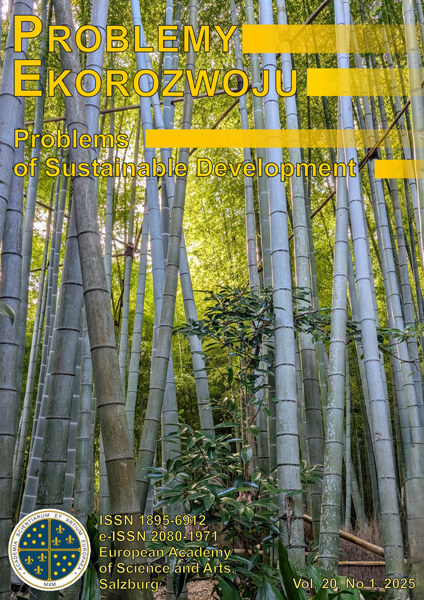Gandhijska interpretacja Bhagavad Gity: rozwiązanie dla zrównoważonego życia
Namarta Sharma
namrata.ssharma@gmail.comMaharaja Agrasen Institute of Technology, Delhi (Indie)
https://orcid.org/0000-0003-2397-2200
Abstrakt
Mohandas Karamchand Gandhi, apostoł niestosowania przemocy i satyagraha (mocnego trzymania się prawdy), powtarza wezwanie Krishny do bezinteresownego działania w swoim rozumieniu Bhagavad Gity, do tworzenia społeczeństwa, w którym wszyscy ludzie na świecie są w stanie współpracować pokojowo, aby zaspokoić swoje potrzeby. Wezwanie Gandhiego do bezinteresownego działania ma potencjał, aby idealnie zsynchronizować się z planem działania na rzecz osiągnięcia Celów Zrównoważonego Rozwoju (SDGs) przedstawionych przez Program Narodów Zjednoczonych ds. Rozwoju (UNDP), na rzecz pokojowego i godnego życia wszystkich. Gandhi propaguje potrzebę wewnętrznego rozwoju duchowego, ponieważ sam postęp materialny może nawet zniszczyć ludzkość i jej środowisko. Komentarz Gandhiego do Anasakti Yoga z Bhagawadgity jest próbą przekazania przesłania o zrównoważonym życiu ludzkości, którego on sam doświadcza. Niniejszy artykuł zakłada, że przesłanie Gandhiego stanowi rozwiązanie dla świata, który jest dotknięty niezliczonymi problemami, zwłaszcza ekologicznymi, stanowiącymi zagrożenie dla ludzkości. Gandhi postuluje, że pożądania mają tendencję do odwracania uwagi ludzi od właściwego życia. Jak je stłumić? Aby odpowiedzieć na to pytanie, Gandhi interpretuje Bhagawadgitę na swój nowatorski sposób i przedstawia własne doświadczenia życiowe w kontrolowaniu zmysłów, źródła pożądań. Niniejszy artykuł sugeruje, że wiedza z oddaniem połączona z bezinteresownym działaniem utoruje drogę do zrównoważonego rozwoju.
Słowa kluczowe:
bezinteresowne działanie, praca przy chlebie, zrównoważony tryb życia, wiedza, wegetarianizm, oddanieBibliografia
1. AGARWAL S. P., 1993, The Social Role of the Gita: How and Why, Motilal Banarsidas, Delhi.
Google Scholar
2. All India Council of Technical Education, 2021, https://fdp-si.aicte-india.org/3dayUHV_download.php (2.01.2021).
Google Scholar
3. BASHEER M., NECHIFOR V., CALZADILLA A. et al., 2022, Balancing national economic policy outcomes for sustainable development, Nat Commun, 13: 5041, https://doi.org/10.1038/s41467-022-32415-9.
DOI: https://doi.org/10.1038/s41467-022-32415-9
Google Scholar
4. BOARDMAN D., RANGER G., 1996, Teaching Sustainable Development, Teaching Geography, 21(4): 161-167.
Google Scholar
5. DATTA P., BHAGIRATH B., DIL B.R., 2024, India's approach to agroforestry as an effective strategy in the context of climate change: An evaluation of 28 state climate change action plans, Agricultural Systems (214): 1-11, https://doi.org/10.1016/j.agsy.2023.103840.
DOI: https://doi.org/10.1016/j.agsy.2023.103840
Google Scholar
6. DHIMAN S.K., 2016, Ethics and Spirituality of Sustainability: What Can We All Do? The Journal of values-based Leadership, 9(1): 11.
DOI: https://doi.org/10.1007/978-3-319-34235-1_1
Google Scholar
7. FRAMARIN C.G., 2006, The Desire You are Required to Get Rid of: A Functionalist Analysis of Desire in the Bhagavad Gita, Philosophy East and West, 56(4): 604-617.
DOI: https://doi.org/10.1353/pew.2006.0051
Google Scholar
8. JAEGER J., 2023, These 8 Countries Are Scaling Up Renewable Energy the Fastest, World Resources Institute, https://www.wri.org/insights/countries-scaling-renewable-energy-fastest (3.08.2024).
Google Scholar
9. JORDENS J.T.F., 1991, Gandhi and the Bhagavad Gita, Modern Indian interpreters of the Bhagavad Gita, ed. Minor R. N., Sri Satguru Publications, Delhi: 88-109.
Google Scholar
10. GANDHI M. K., 1927, My Experiments with Truth, Navajivan, Ahmedabad.
Google Scholar
11. GANDHI M.K., 1944, From Yerveda Mandir, Navajivan, Ahmedabad.
Google Scholar
12. GANDHI M.K., 1956, The Message of the Gita, Navajivan Publishing House, Ahmedabad.
Google Scholar
13. GANDHI M.K., 1999, An Autobiography: The Story of My Experiments with Truth, Navajivan Publishing House, Ahmedabad.
Google Scholar
14. GANDHI M.K., 2011, The Bhagavad Gita: According to Gandhi, Orient Publishing, Delhi.
Google Scholar
15. GREEN CITY TIMES, n.d., Green City: Bus Rapid Transit and Urban Planning in Curitiba, https://www.greencitytimes.com/curitiba/#:~:text=Curitiba%20has%20become%20an%20international%20model%20for%20sustainable,helped%20create%20what%20the%20city%20has%20become%20today/ (23.08.2023).
Google Scholar
16. HUGHES T. P. et.al., 2003, Climate change, human impacts, and the resilience of coral reefs, Science, 301(5635): 929-933, https://doi.org/10.1126/science.1085046.
DOI: https://doi.org/10.1126/science.1085046
Google Scholar
17. NARANG A., NARANG A., 2015, The Imperative of Vegetarianism and Veganism for World Peace, India International Centre Quarterly, 42(2): 126-136.
Google Scholar
18. NITZE W.A., 1993, The Economic Case for Sustainable Development, Issues in Science and Technology, 9(4): 29-32.
Google Scholar
19. NOBIS N., 2002, Vegetarianism and Virtue: Does Consequentialism Demand Too Little?, Social Theory and Practice, 28(1): 135-156.
DOI: https://doi.org/10.5840/soctheorpract20022816
Google Scholar
20. MULIA P., BEHURA A. K., KAR S., 2016, Categorical Imperative in Defense of Strong Sustainability, Problemy Ekorozwoju/ Problems of Sustainable Development, 11(2): 29-36.
Google Scholar
21. RAMANATHAN P.S., 1947, The Ethical and Religious Ideas of Mahatma Gandhi, Indian Quarterly, 3(3): 274-286.
Google Scholar
22. SHARMA N., BEHURA A. K., 2019, Devotion, Knowledge and Service: Gandhi’s Interpretation of the Gita, Journal of Dharma, 44(3): 269-288.
Google Scholar
23. SHARMA N., 2023, The Bhagavad Gita: An Answer to Socratic Question How Should We Live, http://hdl.handle.net/10603/472781 (2.10.2024).
Google Scholar
24. SIVANAND S., 1961, All About Hinduism, The Divine Life Society, Rishikesh.
Google Scholar
Autorzy
Namarta Sharmanamrata.ssharma@gmail.com
Maharaja Agrasen Institute of Technology, Delhi Indie
https://orcid.org/0000-0003-2397-2200
Statystyki
Abstract views: 34PDF downloads: 4









